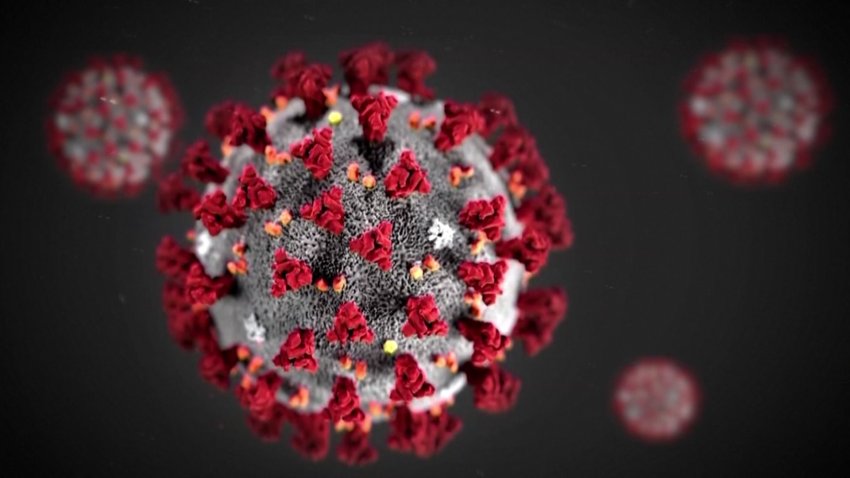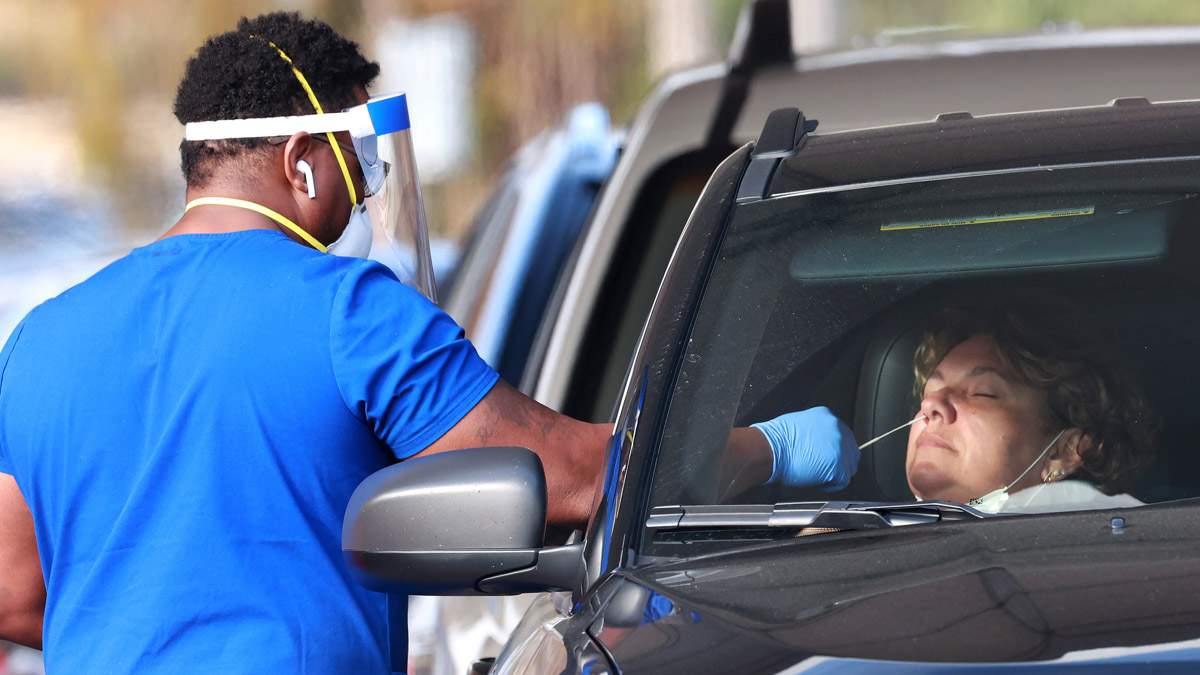The Tarrant County Public Health Department confirms 1,777 new cases of COVID-19 Thursday along with seven new deaths, bringing the county’s total number of confirmed and probable cases of the virus to nearly 88,000 with 818 fatalities.
The Tarrant County Public Health Department confirms 1,777 new cases of COVID-19 Thursday along with seven new deaths, bringing the county's total number of confirmed and probable cases of the virus to nearly 88,000 with 818 fatalities.
In the last two days, the county has announced nearly 4,000 new cases of the virus. Of the additional cases reported Thursday, data from the county health department indicates there are 1,598 more confirmed cases than the day before and 179 more probable cases.
Watch NBC 5 free wherever you are
"What’s more interesting is this is not any kind of backlog. Yesterday’s numbers, there were only four cases that were more than 30 days old. 95% of the cases were within the last week," Tarrant County Public Health director Vinny Taneja told NBC 5 Thursday.
Taneja said while new COVID-19 cases are reported everyday, the public is urged to pay attention to hospital data and the overall trend of key metrics. As of Thursday, Tarrant County's positivity rate was 16%.
Get top local stories delivered to you every morning with NBC DFW's News Headlines newsletter.

"In other words, one in six people going to get a test are coming back positive. That’s high," Taneja said. "If things are trending up on the indicators, then that’s generally bad. We don’t want the disease trending up. We want the disease trending down."
The latest seven victims of the virus include a man from Fort Worth in his 70s, a man from Arlington in his 70s, a woman in Fort Worth in her 70s, a woman from Fort Worth in her 60s, a woman from Arlington in her 60s, a man from Fort Worth in his 50s, and a woman from Arlington in her 30s. Six of the individuals had underlying health conditions.
On Wednesday, Fort Worth Mayor Betsy Price and her husband Tom were both confirmed to have contracted the virus. In a statement, the mayor said she and her husband were showing only mild symptoms and were quarantining at home.
Tarrant County began reporting both probable and confirmed cases in August at the request of the state health department. Probable cases, the county said, account for a variety of real-world situations and could highlight cases in the community that may otherwise go unreported. To date, the county has reported 77,738 confirmed cases of the virus and 9,798 probable cases for a total of 87,536 cases.
COVID-19 Latest
The county is also reporting another 767 estimated recoveries, bringing the total number of survivors to 63,990. There are currently an estimated 22,728 active cases in the county, the most of any North Texas county.
Of the county's cases, 70% of those who have died were over the age of 65 even though they only make up 10% of the cases. Those aged 25 to 44 make up the largest percentage of people with COVID-19 at 36%.
The health department reports 764 COVID-19 patients are currently occupying hospital beds in the county on Thursday -- about 15% of capacity and 30 fewer than were hospitalized Wednesday. TCPH data shows 828 ventilators on hand with 567 being available; of the 261 in use (11 fewer than on Wednesday) it's not clear how many are in use by COVID-19 patients.
Earlier this week, Tarrant County officials reported 36 intensive care unit beds remaining in Tarrant County. As of Thursday, Taneja said there are 29 in the county.
About 40% of the ICU beds are occupied by COVID-19 patients, Taneja said.
"People don’t realize that nationally, of all the people that get hospitalized with COVID, almost 65% end up needing ICU care," he said. "That’s the ripple impact, right? If COVID starts to consume your ICU beds or other hospital beds, you have to pick…'ok, normally we would put this person in the ICU but ICU is full'. We do not want this disease to burden the healthcare system."
The DFW Hospital Council's confirmed Wednesday there are 2,231 people in North Texas hospitals with COVID-19, a slight drop from Tuesday's 2,264 patients. COVID-19 patients in DFW represent 14% of available beds and 34% of ICU patients, according to the council.
In Lubbock on Thursday, Gov. Greg Abbott held a press conference discussing antibody treatment and vaccine progress while also addressing the statewide. Abbott assured, there would not be another shutdown.
"There are plenty of tools in the toolboxes of local authorities to achieve the results that are needed," Abbott said. "If you go back to my last executive order that provided what the protocols were if hospitalizations increased above a threshold level in a particular region, it provided additional tools such as a closing down bars, such as producing occupancy capacity and other tools that local officials do have."
This week, Tarrant County Public Health issued a public health warning that recommended things like avoiding non-essential travel and large gatherings. It is not a mandate or order, Taneja said.
Right now, Tarrant County's hospitalization capacity has reached15%. However, Taneja said the county is considered to be in "Trauma Service Area E" (TSA) under Abbott's executive order. The TSA includes about 20 counties within North Texas that also included and while Tarrant County has reached 15% capacity, but they cannot act on their own.
"If the TSA gets above 15% threshold, which the TSA is at 14.12%, and stays there for a week, then those automatic rollbacks kick in. Bars close, restaurant get reduced to 50% capacity and some other measures," he said. "I know we’re all tired of COVID and we don’t want to hear about it and just get with our family but please, this year for this year for Thanksgiving, celebrate with your own individual family. Do not have extended family come over, any neighbors come over. We just can’t risk it."
With 818 deaths now attributed to the virus, COVID-19 is now projected to be the third-leading killer of Tarrant County residents behind cancer and heart disease and is expected to surpass the annual total for stroke later this year.
COVID-19 causes a respiratory illness with cough, fever and shortness of breath and may lead to bronchitis, severe pneumonia or even death. For more information go to coronavirus.tarrantcounty.com or call the Tarrant County Public Health information line, 817-248-6299, 24 hours a day, seven days a week.


